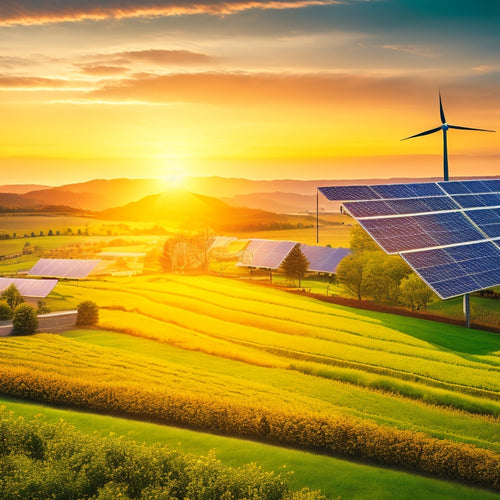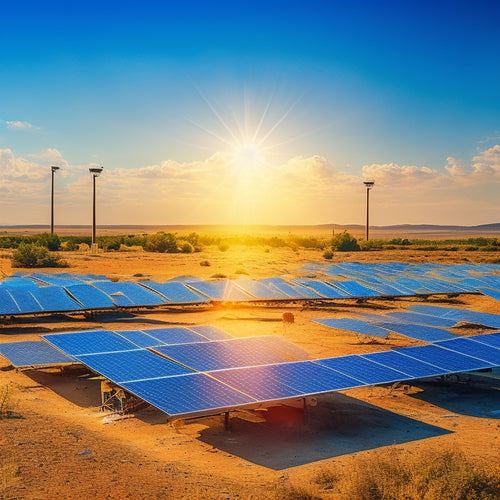
Compact Solar Panels
Share
You can utilize sunlight efficiently with compact solar panels, which convert energy at high rates, making them ideal for urban areas where space is limited. Advances in technology have increased panel efficiency, reducing costs and environmental impact. With a focus on high-power density, you can generate more energy from a smaller surface area. Look for panels that achieve 20 watts per square foot for peak energy generation. As you investigate compact solar panels, you'll realize how they can enhance energy independence, reduce your carbon footprint, and provide power on your terms, and there's more to uncover about their potential to change your energy environment.
The Essentials
- Compact solar panels convert sunlight into electrical energy efficiently, with advancements in technology improving panel efficiency and reducing costs.
- High-power density panels are ideal for urban applications with limited space, reducing system size, weight, and cost.
- Compact solar panels contribute to a reduced carbon footprint, promoting sustainability, and are increasingly favored due to market trends and cost efficiency.
- Thinner silicon wafers improve energy harvesting efficiency, leading to lower material costs without performance loss, and enhanced thermal management.
- Compact solar panels enable seamless grid integration, allowing for reliable clean energy and the sale of excess energy back to the grid.
High Efficiency Energy Harvesting
You need compact solar panels to convert sunlight into electrical energy efficiently.
The energy conversion rate matters, as it directly affects the amount of power you can generate.
With the goal of achieving grid parity, optimizing power density is essential for maximizing energy harvesting in a limited space, especially when considering the space constraints of traditional solar panels.
Now, you'll want to optimize power density, which is vital for maximizing energy harvesting in a limited space.
Energy Conversion Rate
The photovoltaic cells in compact solar panels boast an impressive energy conversion rate, ensuring high-efficiency energy harvesting. This means you can generate more power from a smaller surface area, making compact solar panels an attractive option for those looking to maximize energy production while minimizing space.
| Solar Panel Features | Benefits |
|---|---|
| High-efficiency photovoltaic cells | Increased energy conversion rate |
| Advanced panel innovation | Improved energy storage capabilities |
| Enhanced grid integration | Smoother energy transmission |
| Cost-efficient design | Reduced installation costs |
| Environmentally friendly materials | Lower environmental impact |
As you investigate compact solar panels, you'll notice significant advancements in solar technology. These innovations have led to improved panel efficiency, reduced costs, and increased adoption. With the ability to integrate seamlessly with the grid, compact solar panels offer a reliable source of clean energy. As market trends continue to shift towards renewable energy sources, compact solar panels are ready to play a key role in the shift.
Power Density Matters
As the demand for renewable energy sources continues to surge, compact solar panels have emerged as a breakthrough in the industry, and power density matters greatly in this scenario.
You're likely aware that the amount of energy generated per unit area is vital in determining the efficiency of solar technology. This is where power density comes in – it's a measure of how much power can be generated per unit area of the solar panel.
In fact, homeowners of small houses often face challenges in finding the right solar panel solution, leading to issues like inadequate power generation and unsightly installation Renewable Energy Systems.
In urban applications, where space is limited, high-power density solar panels are indispensable. They enable you to generate more energy from a smaller surface area, making them ideal for rooftops, balconies, or even building facades.
Compact solar panels with high power density can greatly reduce the overall system size, weight, and cost, making them more feasible for urban installations.
By maximizing power density, you can reap the benefits of renewable energy without sacrificing precious space.
With advancements in solar technology, you can expect even higher power densities in the future, further increasing the viability of compact solar panels in urban settings.
Increased Energy Independence
You'll gain more control over your energy needs with compact solar panels, which offer increased energy independence through the integration of renewable energy sources.
By utilizing portable solar panels, such as those offered by Renogy, you can capture energy from the sun anywhere, anytime. This means you'll have power on demand, without relying on the grid.
Renewable Energy Sources
Three decades of technological advancements have propelled renewable energy sources to the forefront of the quest for increased energy independence. You're now part of a movement that's breaking free from fossil fuels and embracing a cleaner, greener future. Renewable energy sources offer a promising solution, and you're likely wondering what options are available.
| Renewable Energy Source | Benefits |
|---|---|
| Solar Power | Captures energy from the sun, reducing carbon footprint and energy costs |
| Hydro Power | Generates electricity from moving water, providing a reliable and renewable source |
| Wind Power | Converts wind energy into electricity, reducing reliance on fossil fuels |
| Geothermal Power | Utilizes heat from the Earth's core, offering a consistent and clean energy supply |
As you investigate these options, you'll uncover that solar innovation has been a significant driver of energy sustainability. With compact solar panels, you can generate electricity on your own terms, reducing your reliance on the grid and enjoying increased energy independence.
Power on Demand
Harness the power of compact solar panels and take control of your energy needs with power on demand. With advanced solar technology, you can generate electricity on your own terms, storing excess energy for later use through power storage systems.
This level of energy management allows you to optimize your energy consumption, reducing your reliance on the grid and increasing your independence.
Compact solar panels also enable seamless grid integration, allowing you to sell excess energy back to the grid and offset your energy costs. This not only benefits you as a consumer but also contributes to a more sustainable energy environment.
You'll enjoy cost efficiency, flexibility in installation options, and the satisfaction of supporting market trends that prioritize sustainability practices.
As the technology continues to evolve, you can expect future innovations to further enhance the benefits of compact solar panels, solidifying their position as a cornerstone of renewable energy solutions.
Thinner Silicon Wafers Used
You're looking at a significant advancement in compact solar panel technology, and it starts with the silicon wafers.
By leveraging high-efficiency solar solutions renewable energy systems, manufacturers can create more efficient energy harvesting systems that maximize energy generation.
This design optimization enables you to capture more energy per unit area, making the most of available space.
Wafer Thickness Reduction
The pursuit of compact solar panels has led to significant advancements in wafer thickness reduction. You're now witnessing a shift towards thinner silicon wafers, which is revolutionizing the industry.
In wafer manufacturing, reducing thickness means lower material costs, directly impacting the overall production expenses. This cost reduction doesn't compromise performance stability, as technological advancements guarantee that thinner wafers maintain their efficiency.
Market trends suggest that consumers are driving the demand for more efficient and eco-friendly solutions, pushing manufacturers to innovate. As a result, recycling methods are being developed to minimize the environmental impact of solar panel production.
Thermal management is also improving, allowing for better heat dissipation and increased performance. While scalability issues remain, material innovation is addressing these challenges.
As you investigate the compact solar panel market, you'll notice a focus on sustainability, driven by the need for freedom from environmental and economic constraints.
Efficient Energy Harvesting
Silicon wafers, now thinner and more efficient, are clearing the path for compact solar panels that can harvest energy more effectively. As you consider installing compact solar panels, you'll benefit from the latest advancements in solar technology.
The compact design enables more efficient energy harvesting, reducing the space required for installation. This development also leads to increased energy storage capabilities, allowing you to store excess energy for later use.
In terms of installation benefits, compact solar panels offer a more streamlined process, reducing labor costs and time. Market trends suggest that consumer adoption will increase as the cost of compact solar panels decreases.
Future innovations will focus on improving energy storage and efficiency, further reducing the environmental impact of solar energy. Urban applications, in particular, will benefit from compact solar panels, as they can be easily integrated into building designs.
When conducting a cost analysis, consider the long-term savings and potential revenue generated from selling excess energy back to the grid. As the technology continues to evolve, you can expect to see widespread adoption of compact solar panels, leading to a significant reduction in our reliance on fossil fuels.
Check Wattage per Square
When evaluating compact solar panels, you need to take into account power density, which is measured in watts per square meter or square foot.
Since space is limited, it's essential to maximize energy output per unit area. High-efficiency solar panels with sleek black designs can considerably enhance the aesthetic appeal of your home while providing renewable energy sustainable solar systems.
Power Density Matters
About 20 watts of power per square foot is the benchmark you should aim for in a compact solar panel, as this density guarantees you're getting the most energy possible from a limited surface area.
This power density matters because it directly affects how much energy you can generate in a given space. In a compact design, space optimization is essential, and a high power density guarantees you're making the most of every inch.
When evaluating compact solar panels, check the wattage per square foot to confirm it meets this benchmark. Anything lower, and you may be sacrificing energy output for the sake of compactness.
A higher power density also means you can generate the same amount of energy with a smaller panel, giving you more flexibility regarding installation and placement.
Efficient Space Use
Maximize your compact solar panel's energy output by optimizing its space use. When it comes to efficient space use, every square inch counts.
You need to verify that your compact solar panel is generating the maximum amount of power per unit area. To achieve this, look for space-saving designs that pack more watts per square foot.
Check the wattage per square foot of your compact solar panel to gauge its space efficiency. A higher wattage per square foot indicates a more efficient use of space.
This is particularly important for urban applications where rooftops or balconies may have limited space. By choosing a compact solar panel with a high wattage per square foot, you can generate more power without sacrificing precious space.
This freedom to generate clean energy in limited spaces is what makes compact solar panels so appealing.
Reduced Carbon Footprint Design
You're looking for a compact solar panel that not only saves space but also reduces your environmental impact.
By opting for a reduced carbon footprint design, you'll be choosing an eco-friendly energy source that minimizes greenhouse gas emissions.
This approach guarantees a cleaner, more sustainable power generation process that benefits both you and the planet.
Eco-Friendly Energy Source
Compact solar panels are designed with a reduced carbon footprint in mind, making them an eco-friendly energy source for various applications. As you consider adopting sustainable technology, you'll find that compact solar panels offer a reliable solution for reducing your environmental impact.
These solar innovations are designed to integrate seamlessly with the grid, allowing you to store excess energy for later use. With government-backed solar incentives, the cost of installation is decreasing, making it more accessible to consumers.
However, you may still face installation obstacles, such as finding suitable roof space or maneuvering policy support. Despite these challenges, market trends suggest that compact solar panels are becoming increasingly popular, driven by growing consumer awareness of the need for eco-friendly energy sources.
Frequently Asked Questions
Can Compact Solar Panels Be Used for Residential Purposes?
You're considering utilizing renewable energy for your home; yes, compact solar panels can be a viable option for residential purposes, offering energy efficiency and flexible installation options to suit your unique needs and space constraints.
Are Compact Solar Panels More Expensive Than Traditional Ones?
You'd think smaller means cheaper, but surprisingly, compact solar panels often come with a higher price tag due to advanced technology and premium materials, making them more expensive than traditional ones in a cost comparison.
How Do I Clean and Maintain Compact Solar Panels?
You'll want to employ gentle cleaning techniques, avoiding harsh chemicals, and follow maintenance tips like regular inspections and debris removal to guarantee ideal performance, increasing your energy independence and freedom from fossil fuels.
Can I Install Compact Solar Panels Myself or Hire a Pro?
You're about to set out on a brighter adventure! When it comes to installation, you're faced with a dilemma: take the DIY route, ensuring freedom from external dependencies, or opt for professional services, guaranteeing knowledge and efficiency.
Are Compact Solar Panels Durable and Weather-Resistant?
You'll want to make certain your solar panels withstand harsh weather conditions; look for ones that have passed rigorous durability testing, assuring weather resistance and a long lifespan, so you can enjoy uninterrupted energy independence.
Final Thoughts
As you consider compact solar panels, remember that "necessity is the mother of invention." The drive for sustainable energy has led to innovations like high-efficiency energy harvesting, thinner silicon wafers, and reduced carbon footprint design. By checking the wattage per square, you'll find that these compact panels pack a punch. With increased energy independence within reach, it's time to capture the power of the sun and take control of your energy future.
Related Posts
-

Net Metering in Renewable Energy's Future
Net metering's future is vital for driving renewable energy growth and financial savings. You can reduce your electri...
-

What Happens Without a Charge Controller in Solar Panels
Without a charge controller in your solar panel system, you risk overheating batteries due to overcharging, which can...
-

Top 10 Off Grid Camping Gear Must-Haves
When you're off-grid camping, the right gear is crucial for a smooth expedition. Start with a durable, weather-resist...


